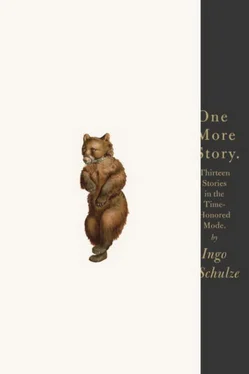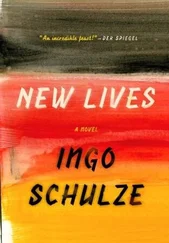Yes, I did hope that we would have to fold. All the same I couldn’t bring myself to make mistakes on purpose. I wanted to lose out not to the competition but to circumstance. But evidently our responses were always the right ones.
In 1993—and by then there wasn’t a soul who hadn’t realized that there would be no economic miracle — we totally demoralized our rivals with our delivery service. But a year later, when we lost the bid for a copy shop at the Technical University, I figured that was the end. But then we started giving students and the unemployed a discount, kept our prices low — and what do you know, it wasn’t us but Technical Copy that went belly up.
I wish nowadays I still had that same effortless flair for regarding difficulties as a mathematical problem, an equation to be solved. I knew that we had to grow, not because we had done any market research, but because B. consists of three zones, the old city, the new city, the Technical University. Besides which, three is a good number, the best, if you ask me. Once you have three copy shops in a city like B. you’ve sucked up the air for everyone else. Nevertheless I was surprised each time my calculations worked out.
After my separation from Julia, contacts with friends, in fact even my relationship with my brother — two years younger than I, an orthopedist — were almost totally broken off. Everyone suddenly had too much to do, or they moved away or simply faded into the woodwork, just as I had done. I didn’t want to have to explain to anyone why I was living with Ute now instead of Julia.
Of course the pain subsided, I’d be lying if I were to claim anything different. But pain was still a constant companion, a shadow, sometimes a demon that could attack out of the blue. All it took was the fragrance of strawberries or for someone to speak Hungarian or just the sound of familiar music (I particularly had to beware of Brahms and Suzanne Vega). Often I had no idea what had lured the demon back. Summer months were the hardest, and strangely enough, autumn was my best time. But New Year’s Eve was ghastly. Someone would say, “just two hours till midnight,” and I would think: I’ve got two hours left to find Julia. And when it came down to counting minutes and finally seconds, I wanted to scream. What was I doing here in the middle of a meaningless life among strangers? Every year I was convinced that this would be my last New Year’s Eve, I wouldn’t be able to endure another. It took days, sometimes weeks, for me to calm down again. One year, it must have been in the midnineties, I lay wide awake on my back, beside Ute. Suddenly she asked me whether I still thought of Julia often. I barely had time to hide my face in my hands before I broke into sobs. It’s a mystery to me how Ute put up with my theatrics.
Another woman? And how was that supposed to happen? It was difficult, impossible actually, for me to fall in love in B. An affair with one of the students who worked for us was not what I was after — which probably explains why there were never any sparks. And otherwise? I could hardly take out lonely hearts ads, although I constantly read them, looking for one that would be a match with Julia.
But then I did in fact hear about her.
Ute believed that when it came to her circle of friends I got along best with Claudia, whom she had known since kindergarten and grade school in Döbeln. Claudia worked as a bookkeeper for a theater in Berlin — it’s not important which — and hung around, as Ute put it, with theater types. Ute must have said something to her about Julia. And so during a visit in Berlin in February 1997, I learned from Claudia that Julia had a child, a daughter. That upset me less than the fact that someone had spoken the name Julia in my presence and had called her (with a certain undertone — with Claudia there are almost always undertones) “your great love.”
Until the call in October 1999 that I mentioned previously, it was never clear to me from the few things that Claudia told me about her if Julia was a kind of secret between Claudia and me or if Claudia likewise kept Ute up to date. What I’m trying to say is that hearing Claudia speak Julia’s name had not been totally unexpected. But all the same it was like being awakened out of a profound stupor. “And your Julia too!”
So there I sat in my office chair, my right foot on the handle of the desk drawer, the tip of my shoe wedged in under the desktop, listening to Claudia chatter away while I gazed through the open Venetian blind out into the shop. Even when the place is bustling, at the beginning of the winter semester, for instance, our employees are still identifiable by their white T-shirts. To me the “Copy 2000” written across the breasts of female students always looked just a bit obscene. But it had been Ute’s idea, and no one ever complained. The red lettering has faded on the shirts of those who have been with us for a while, but glows like a signal on new hires. I counted four of our T-shirts, recounted, but couldn’t figure out who was missing. I tried to calm myself down. When Claudia mentioned Julia a second time, I couldn’t take it any longer. “Julia?” I asked, reaching for the file of designs for our new logo, with the 2000 dropped from our name.
“Well finally!” Claudia groaned. “I thought maybe your ear had fallen asleep.” This was followed by sentences that I could repeat here word for word, the last of which was: “She loves you more than ever, it’s that simple.”
And I — believed her.
Claudia asked how things were going with us. I told her about the problem of adjusting our software for the year 2000 and that we were considering changing the name of our company.
“Right,” Claudia said. “You might just as well call yourselves 1900”
At the end she asked, “So you guys will be coming?”
“We’ll be there,” I said and felt myself reentering the present. All of a sudden there was a stab of pain in my toes, and I removed my foot from the desk drawer handle. I sat up straight and put the receiver back on its hook. I was glad — yes, I was proud — to have held out all those years, and limped out into the shop.
That evening I arrived home at almost the same time as Ute. She was in high spirits because just before closing an order had come in from the school district, and right afterward there was a call from the municipal office in Gotha, which wasn’t even in our market area — meaning we had prospects of some substantial extra business.
I mentioned Claudia’s invitation, and Ute said, “Why’s she bothering you? She’s got my number.”
“Do you want to go?” Ute asked later.
“We’re probably not going to come up with any better plan,” I said. Ute had in fact tried to arrange something special, but Vienna was already fully booked, so was Prague.
“Then I’ll follow through on it,” Ute said, picking up the phone and wandering into the living room with a half-peeled orange.
My mood over the next two and a half months could best be rendered as one of “Hail and Farewell.” Unfortunately I can remember only the title of Goethe’s poem and our German teacher’s enthusiasm for it, but if called upon to describe how I felt, that was it exactly: hail and farewell.
I had just a little under a hundred thousand marks in my bank account, was driving a Mercedes SL that was almost paid for, and wasn’t married.
I cleaned out my desk, dealt with the backed-up mail, worked through all outstanding accounts, including a few I turned over to a collection agency, and shredded piles of paper. Among letters from my father I found some contract bids that I had completely forgotten about.
I turned over all the odds and ends from the autumn of ’89 to the city historical museum and tossed the receipt they gave me into a trash basket.
Читать дальше












